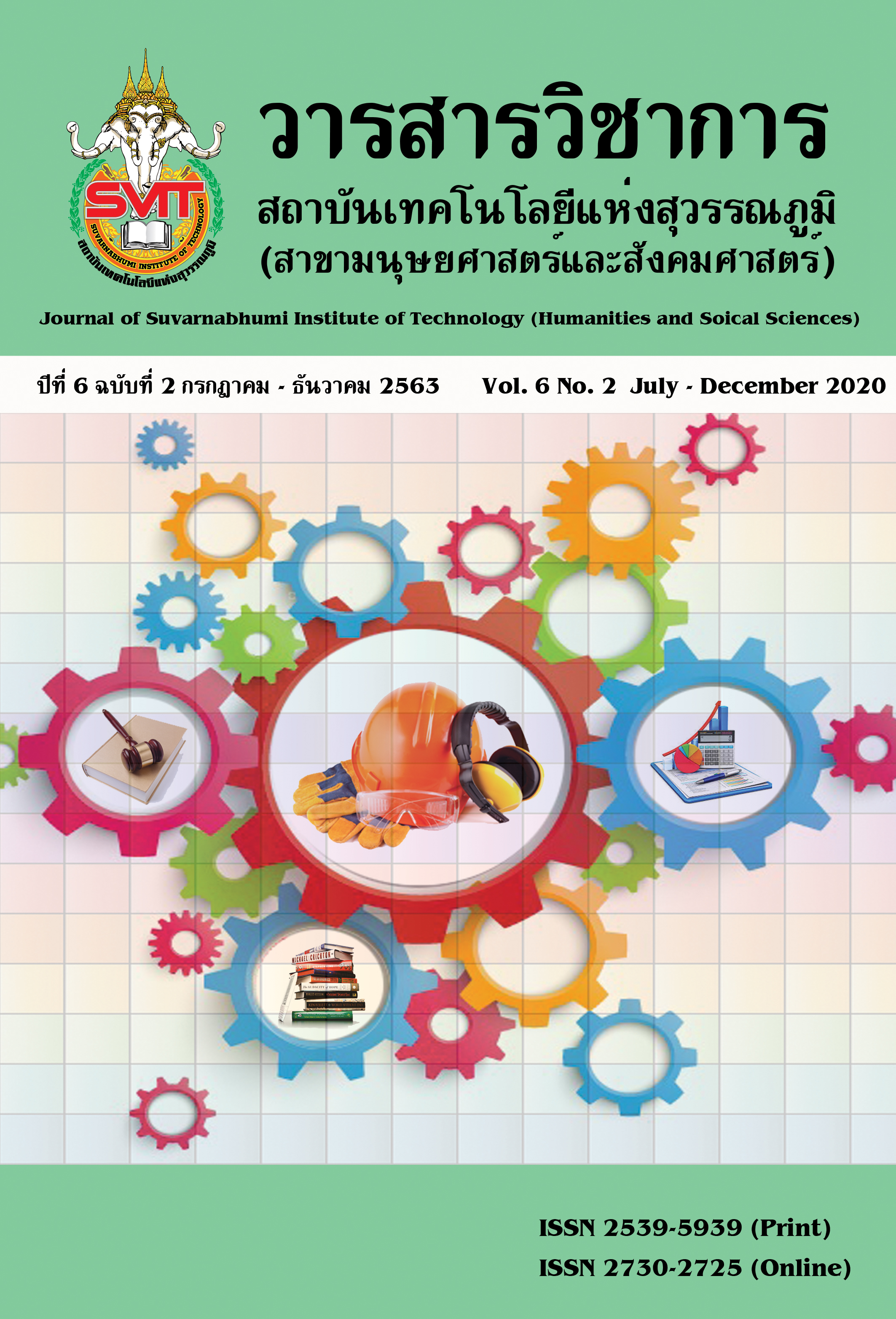THE DEVELOPMENT OF PERSONNEL COMPETENCE IN TOURISM AND HOSPITALITY INDUSTRY UNDER THE ASEAN FRAMEWORK OF ENTERPRISE IN ANDAMAN COASTAL PROVINCES
Keywords:
Development, Personnel Competence, Tourism and Hospitality industry, ASEAN FrameworkAbstract
The purpose of this research were to 1) Study the characteristic and methods of personnel competency development in Tourism and Hospitality Industry 2) Study the problem, difficulty and success result of personnel competency development in Tourism and Hospitality industry3) Provide guideline for developing personnel competence to achieve the standard of ASEAN Framework Agreement in 2 branches, 6departments, 32 positions included 4 departments, 23 positions of hotel services branches and 2 departments, 9 positions of travel services branches in Andaman Coastal Provinces. This research was qualitative research using an in-depth interview technique, where the researcher chooses to use the sample sampling method (Purposive sampling),Including executive groups of hotel services branch and travel service branch, Employees in the positions under the ASEAN Professional Competency Framework of 32 positions, other entrepreneurs involved in the tourism industry Academic group as a graduate manufacturer Government agencies as regulators and establish professional competency standards for ASEAN tourism Hotel Business Association And hotel business operators And a group of tourism business operators
The result showed that the characteristics of tourism industry personnel and knowledge services personnel must have knowledge in the job according to the position. The duties defined in the job description form and knowledge according to the ASEAN competency framework. Must have knowledge of both science and art in the tourism industry and services and various tourist behavior, experience and general knowledge. Skill, Personnel must have communication skills in reading, speaking and writing. Foreign language communication. Human relations, work as a team, have a witty, good problem solving, planning, work negotiation art of service Leadership and professional skills are consistent with the position. Attitude, must love in service, respect to the organization and colleagues, think positively, look optimistic, have volunteers, work as a team, have diligence, honesty, patience, responsibility, punctuality, sacrifice and participation. The findings from this research are that people still lack knowledge, skills and attitudes that are relevant to Job positions and lack of awareness about the ASEAN competency framework Government agencies must increase public relations and issue measures to enforce the implementation of the ASEAN Competency Framework. Educational institutions bring the ASEAN competency framework to be determined in the graduate program. Enterprises define the job description with ASEAN competency framework. To bring ASEAN competencies which are basic competencies by using development methods with education, training and development that different according to the context of job positions and for the further development with the advantage of the service of Thai identity in the service operation, of the establishment for efficiency Succeeded by the ASEAN Competency Framework and International Standards
References
กระทรวงการท่องเที่ยวและกีฬา. (2557). สถิตินักท่องเที่ยว. กรุงเทพฯ
กัญญามน อินหว่าง. (2558). การพัฒนาทรัพยากรมนุษย์เพื่อการพัฒนาองค์การ. จาก https://www. bloggang.com/viewblog.php?id=kanyamon&group (20 เม.ย.61)
กรมการท่องเที่ยว. (2559). สถิตินักท่องเที่ยว. สืบค้น 11 มีนาคม 2560, จาก http://www.tourism. go.th/2010/th/statistic/tourism.php.
โชติชวัล ฟูกิจกาญจน์. (2559). การพัฒนาทรัพยากรมนุษย์. กรุงเทพฯ: บริษัท วี.พริ้นท์ (1991) จำกัด.
ธนาชัย พาณิชย์เศรษฐ์. (2559). AEC ต้องรู้ปฐมบทสวัสดีประเทศไทย. กรุงเทพฯ: บริษัทส.เอเชียเพรส (1989) จำกัด.
ธนสิน จันทเดช. (2560). แนวทางการพัฒนาโปรแกรมการผลิตบุคลากรกลุ่มอุตสาหกรรมการท่องเที่ยวแผนกบริการส่วนหน้าเพื่อเพิ่มศักยภาพการแข่งขันในประชาคมอาเซียน. วารสารวิจัยและพัฒนา วไลยอลงกรณ์ในพระบรมราชูปถัมภ์สาขามนุษยศาสตร์และสังคมศาสตร์, 12(2). 89-102.
บุญเลิศ จิตตั้งวัฒนา. (2551). อุตสาหกรรมการท่องเที่ยว (พิมพ์ครั้งที่ 2). กรุงเทพฯ: บริษัทธรรมสาร จำกัด รายงานภาวะเศรษฐกิจท่องเที่ยว, 2558.
พรชัย เจดามาน, ไพฑูรย์ พิมดี, ขจรศักดิ์ บัวระพันธ์, อัคพงศ์ สุขมาตย์, และคณะ. (2560). การจัดการองค์ การและทรัพยากรมนุษย์กับประเทศไทยยุค 4.0. กรุงเทพฯ: สูตรไพศาสบิวเตอร์
ยุพวรรณ นังคลาภิวัฒน์. (2557). การเตรียมความพร้อมแรงงานด้านการท่องเที่ยวของไทยเพื่อรองรับการเข้าสู่ประชาคมเศรษฐกิจอาเซียน. วารสารวิชาการสมาคมสถาบันอุดมศึกษาเอกชนแห่งประเทศไทย(สสอท.), 20(2).
สถาบันวิจัยเพื่อการพัฒนาประเทศไทย. (2015). การจัดการครึ่งทางทศวรรษ และ บทเรียนการจัดการที่เข้มแข็งจากต่างประเทศ. จาก http://www.roadsafetythai.org/download_pptdetail-edoc-225.html.
สํานักงานสถิติแห่งชาติ. (2557). แผนพัฒนากลุ่มจังหวัดภาคใต้ฝั่งอันดามัน (ระนอง พังงา ภูเก็ต กระบี่ ตรัง) พ.ศ.2557-2560. จาก http://www.slovenia.info/?ps_eko_turizem=0&lng=2
สํานักงานสถิติแห่งชาติ. (2560). ภาวะการทํางานของประชากร. จาก http://service.nso.go.th /nso/nsopublish/themes/files/lfs60/reportJan.pdf
สุรินทร์ พิศสุวรรณ. (2556). อาเซียนรู้ไว้ได้เปรียบแน่ (พิมพ์ครั้งที่7). กรุงเทพฯ: บริษัทอมรินทร์พริ้นติ้งแอนด์พับลิชชิ่งจำกัด.
สุภาวดี ขุนทองจันทร์. (2559). การบริหารทรัพยากรมนุษย์. กรุงเทพฯ: ซีเอ็ดยูเคชั่น
อริสรา เสยานนท์. (2560). การประกอบการในอุตสาหกรรมการท่องเที่ยว. กรุงเทพฯ: บริษัทวี พริ้นท์ จำกัด
Boam, R. & Sparrow, P. (1992). Designing and Achieving Competency. McGraw-Hill, Reading.
Boyatzis, R.E. (1982). Competence at work In a Stewart ED. Motivation and society. San Francisso: Jossey-Bass.
Dessler, G. (2003). Human resource manangement. New Jersey: Prentice Hall.
Harisson, R., & Kesslers, J. (2004). Human resource development in knowledge Beconomy. Basingstoke: Palgrave-Macmillan.
McClelland, D.C. (1975). A Competency model for human resource management specialists to be used in the delivery of the human resource management cycle. Boston: Mcber.
Nadler, Leonard. & Nadler, Zeace. (1980). Corporate Human Resource Development. New York Van Nostrand Reinhold.
Parry, B.S. (1998). Just What Is a Competency? And Why Should You Care? Training, 35, 58-64.
Spencer, L.M., & Spencer, S.M., (1993). Competence at work: Model for superiorperformance. Wiley, New York.
Wanichyada Wajirum, Kanyamon Inwang. (2018). Development of Business of Strategies of Community Enterprise Entrepreneurs: A Case Study on Herbal Product Business in Lower Central Region1. ABAC ODI Journal. 5(1).
World travel & Tourism Council (WTTC), (2016). Travel & Tourism Economic Impact 2016. Autumn Update Summary.
Yorks, L. (2005). Strategic human resource development. Mason: South Western Thomson.
Downloads
Published
Issue
Section
License
The articles published are copyrighted by the Sarasas Journal of Humanities and Social Science. The opinions expressed in each article in this academic journal are those of the individual authors and do not reflect the views of Sarasas Suvarnabhumi Institute of Technology. The authors are solely responsible for all aspects of their respective articles. Any errors or inaccuracies in the articles are the sole responsibility of the authors.



